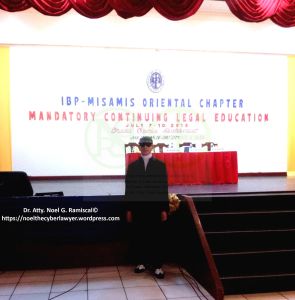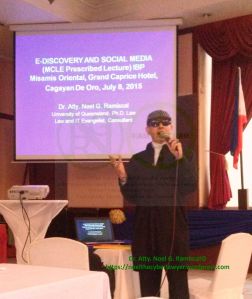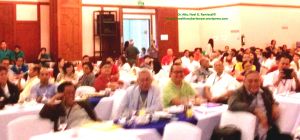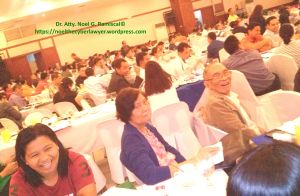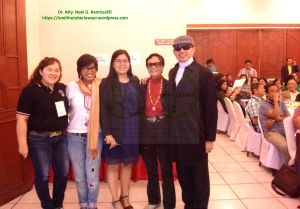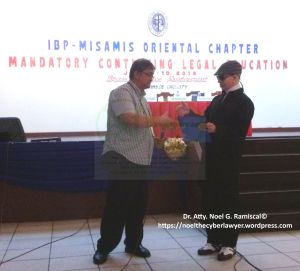One of several heartrending true stories that I recount in my lectures on Data Privacy and on Sexual Orientation Gender Identity and Online Violence, [like the MCLE series of the University of Cebu (UC) and the students of UC last April 27 and 29 of this year], was the case of Amy Boyer. She was a victim of cyberstalking and murder at the hands of a former classmate in 8th grade, whom she had no idea was obsessed with her: Liam Youens.
When their lives took them to different places, Liam continued his obsession with her online. He developed a public website with her name as part of the URL. In this website he documented his violent passion for Amy and the means and ways that he intended to kill her. He went so far as to declare that his greatest regret was in not having killed her in 8th grade.
In order to accomplish his lifelong mission, Liam engaged the services of an online private investigation and information service “Docusearch.com”, in order to obtain the current whereabouts of Amy. Docusearch.com is in the business of procuring and selling pieces of online information about anything or anyone, no questions asked, so long as the price is right and is paid upfront. Its president, Daniel Cohn, is a licensed private investigator in Florida.
Liam contacted Docusearch through its Internet website and requested the date of birth for Amy Lynn Boyer. He gave Docusearch his name, New Hampshire address, and a contact telephone number and paid the $20 fee by credit card. Docusearch provided Liam with the birth dates for several Amy Boyers, but none was for the Amy Boyer sought by him.
On succeeding days, Liam ordered and paid for Amy’s social security number (SSN) which costed $45 fee by credit card, and paid $109 fee twice by credit card for Amy’s employment information. He also requested a “locate by social security number” search for Amy and paid the $30 fee by credit card. Docusearch finally informed Liam of Amy’s employment address at Dr. John Bednar’s office at 5 Main Street, Nashua, New Hampshire. Docusearch acquired this address through a subcontractor, Michele Gambino, who had obtained the information by placing a “pretext” telephone call to Amy in New Hampshire. Gambino lied about who she was and the purpose of her call in order to convince Amy to reveal her employment information. Gambino had no contact with Liam, nor did she know why Liam was requesting the information.
Over a month after finding out where Amy worked, Liam drove to her office, patiently waited for her to come out, fatally shot her, and then killed himself.
The Estate of Amy Boyer sued Docusearch and the case went all the way to the Supreme Court of New Hampshire. The court held among others that private investigators who do not know the purpose or the reason why their client is seeking the information, “creates a foreseeable risk of criminal misconduct against the third person whose information was disclosed” to the client. Private investigators can be held liable by the third person or his/her heirs who suffered from the misconduct caused by the private investigator’s client who acted on the information given by the private investigator.
The New Hampshire Supreme Court discussed the possible deleterious effects of two crimes that are involved which are perpetrated with the use of private investigators: identity theft and stalking, of which Amy Boyer was a victim. “The threats posed by stalking and identity theft lead us to conclude that the risk of criminal misconduct is sufficiently foreseeable so that an investigator has a duty to exercise reasonable care in disclosing a third person’s personal information to a client.” Furthermore, any pretextual phone call or communication by the private investigator based on deception to gather personal information from an unsuspecting 3rd party could be held liable by the 3rd party. Amy’s death brought to the fore the dangers of the unauthorized disclosure of SSN that a law was passed prohibiting the sale or dissemination of SSNs without a legitimate purpose.
Prior to the passage of the Philippine Data Privacy Law (R.A. 10173), I was a Consultant of the former Commission on Information Communication and Technology (CICT) on the separate bills covering cybercrimes and data privacy. I gave a white paper on the Data Privacy Bills which delineated several concerns I had, amongst them, the deleterious impact of the bills on the livelihood of scores of private detective agencies scattered all over the regions of the Philippines.
Private detective agencies under the Data Privacy Law and the Philippine Cybercrime Prevention Act (R.A. 10175) have no express legal authority or legal exemption to collect, process, preserve, or destroy any form of electronic data that constitutes personal information of any data subject, without first informing and getting the written consent of the data subject him/herself. Thus, the surreptitious methods, pretexting and covert operations that detective agencies do to acquire e-data would run contrary to the Data Privacy Law and make them liable to criminal and civil penalties with damages in favour of the data subjects they targeted.
In my lectures, I have mentioned that it is crucial that the National Privacy Commission (NPC) come up with an advisory opinion or proper Guidelines as to the parameters of the allowed operations or processing of personal information of data subjects by commercial and private information brokers like detective agencies. Without such Guidelines, all detective agencies in the Philippines are vulnerable to criminal charges of being data privacy violators.
In closing I would like to thank the very gracious, generous and great UC founder, Atty. Augusto W. Go, the very efficient, understanding and accommodating MCLE Committee and UC staff, the very bright and promising UC law students, and three amazing, gorgeous UC lawyers: Attys. Ria Lidia Espina, Annie Tan and Josh Carol Ventura! My mom and I are truly grateful for the splendid time we had there. Our compliments to the spacious, unpretentious and comfortable Alicia Apartelle which served some of the best crispy pata and lechon kawali we ever tasted! Deo Gratias!

